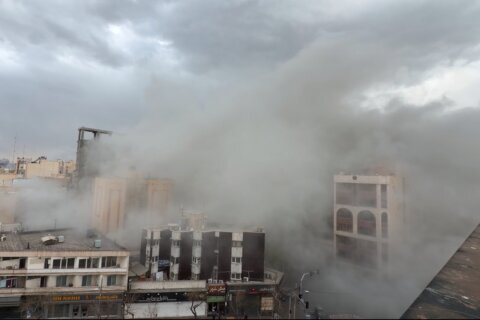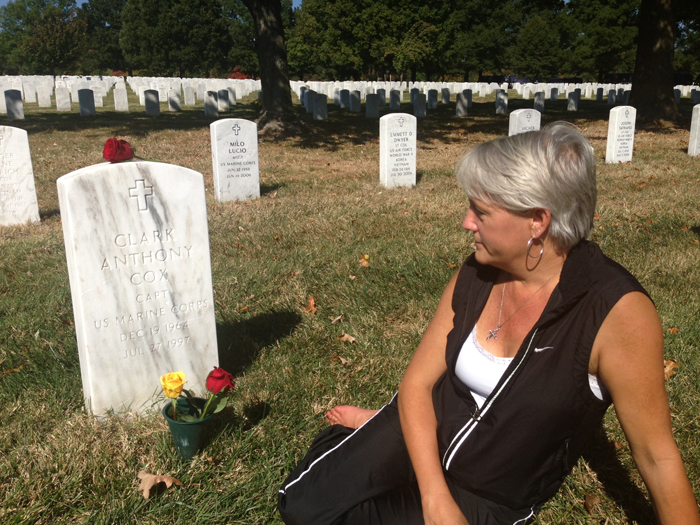
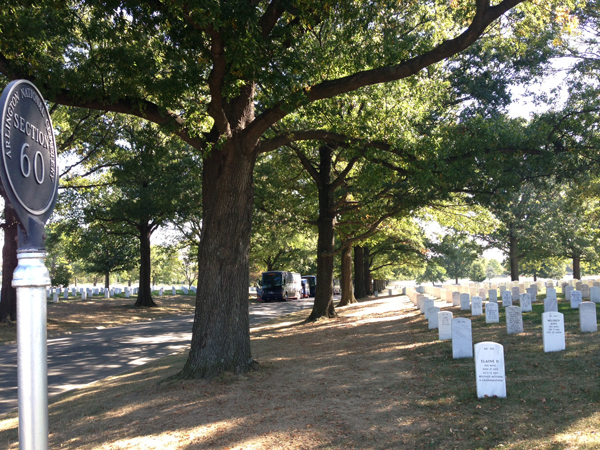
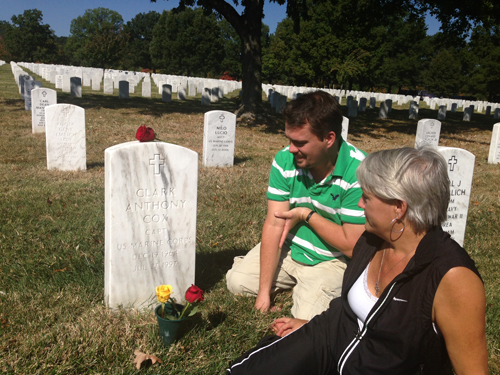
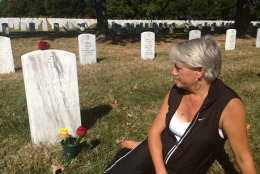
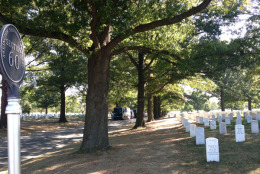
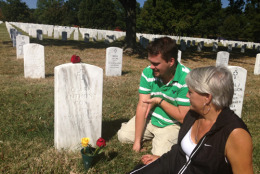
WASHINGTON – Renee Cox was sitting in front of his headstone, with her son and a family friend talking quietly.
She had been crying.
Her son, who appeared to be in his late teens or early 20s, had a handkerchief in his hands.
They had been talking about her husband, his father: Marine Capt. Clark Anthony Cox from Iowa City, Iowa.
He was born Dec. 19, 1964, and died July 27, 1997, in a helicopter crash over the North Atlantic Ocean.
Freshly cut yellow and red roses sat in a small cup of water in front of his headstone.
One red rose lay on top of his gravestone.
The roses are a small way for Capt. Cox’s widow and son to show how much they miss him.
But the recent enforcement of a “longstanding” policy by Arlington National Cemetery has significantly curtailed what they can leave in the cemetery to demonstrate their feelings.
No longer will pictures, letters and other objects that tell the stories of the deceased be allowed at any gravesite, including in section 60, where Cox is buried.
Only fresh cut flowers will be allowed.
Cox is having trouble with that.
“Grieving families need a way to remember,” she says. “They want people to know, ‘This is my loved one and how special they really were and here’s what they looked like and here’s their family.'”
“In order to understand where they are coming from, you need to see those pictures. I think they should be left,” she adds.
Cox says her husband “was a wonderful man.”
“Just an absolute treasure and unfortunately on July 27, 1997, at 2:15 in the morning, I got that dreaded knock at my door to notify me that his aircraft had gone down and they were in the process of searching to find him.
“And then about 18 hours later, I got that additional knock on my door that said they found the bodies. He was a devout, wonderful husband, father and absolutely great guy and missed desperately.”
Arlington National Cemetery released the following statement:
“It’s important to note that ANC’s policy regarding cemetery and gravesite maintenance and upkeep has not changed. As noted in printed materials, the cemetery’s website, and on signage throughout the cemetery, the only item that may be left at any gravesite at any time is fresh cut flowers. In addition to cemetery upkeep, this policy helps ensure the safety of both visitors and workers, who sometimes had objects shoot from mowers during routine lawn care.”
“Many of those who were killed in Iraq and Afghanistan are buried in section 60 of the cemetery,” cemetery spokeswoman Jennifer Lynch adds in a statement. “Over the past several years, Army officials learned that section 60 became a gathering place for friends and family of the fallen.”
For many, it’s a healing experience.
“Without a memorial to these conflicts, we recognized that section 60 is a unique and significant part of our nation’s military history, and the service and sacrifice of our men and women in uniform,” Lynch says.
“Actually I’m a part of that,” says Cox, “even though he (Capt. Cox) didn’t die as recently as these young ones have. Every time I come out here we always make friends with each other and regardless of how they died or when they died, we’re all one big family.”
But there’s another side to the story, according to cemetery officials.
“We have heard complaints from some family members who want the cemetery grounds to be kept in pristine condition, which to so many signifies a commitment to all the fallen and a reflection of the honor bestowed by being interred in Arlington,” Lynch says.
The Advisory Committee on Arlington National Cemetery is “wrestling with these issues as they develop and recommend a permanent policy,” Lynch adds.
Concerned parties will meet on Oct. 6 to try to find a way forward.
“I think they do need to find a way to agree so that there is a permanent piece of something that goes on the headstone,” Cox says. “I personally would like to be able to hang a hook so that at Christmas time and at Easter I can hang a little ornament, something that comes from my heart because he’s still a part of who I am and always will be.”
Numerous families have come to section 60 to visit the graves of loved ones and found their personal tributes gone as part of what some call an unfeeling cleanup.
For some, leaving keepsakes at the cemetery in honor of their loved ones helps to have some closure and control over that grief.
“I can totally understand, because there are mothers and there’s wives and there’s fathers and there’s sisters and brothers grieving over something they had no control over,” Cox says.
For Cox, it’s important for families “to treasure their loved ones, remember them and not have things be stripped away,” she says.
Teary-eyed but smiling, she kneels in front of her husband’s grave and says family members should “absolutely be able to bring mementos and when we’re ready, let us remove our things.”
On her knees, gazing lovingly at her husband’s headstone, her deep loss — 16 years later — is still etched on her face.
Follow @WTOP on Twitter.

